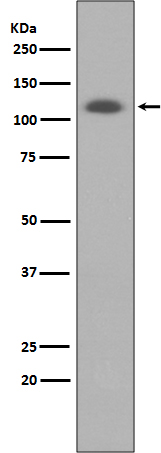
| WB | 1/500-1/1000 | Human,Mouse,Rat |
| IF | 咨询技术 | Human,Mouse,Rat |
| IHC | 1/50-1/100 | Human,Mouse,Rat |
| ICC | 1/50-1/200 | Human,Mouse,Rat |
| FCM | 咨询技术 | Human,Mouse,Rat |
| Elisa | 咨询技术 | Human,Mouse,Rat |
| Aliases | ATP-binding cassette transporter 8; White protein homolog; ABC8; WHT1; ABCG1; ABC transporter 8; WHITE1 |
| Entrez GeneID | 9619 |
| WB Predicted band size | Calculated MW: 76 kDa; Observed MW: 110 kDa |
| Host/Isotype | Rabbit IgG |
| Antibody Type | Primary antibody |
| Storage | Store at 4°C short term. Aliquot and store at -20°C long term. Avoid freeze/thaw cycles. |
| Species Reactivity | Human,Rat |
| Immunogen | A synthesized peptide derived from human ABCG1 |
| Formulation | Purified antibody in PBS with 0.05% sodium azide. |
+ +
以下是关于ABCG1抗体的3篇参考文献的简要概括:
1. **文献名称**:*ABCG1 regulates mouse tissue-specific sterol efflux through a dual mechanism*
**作者**:Kennedy, M.A., et al.
**摘要**:该研究利用ABCG1抗体通过免疫印迹和免疫荧光技术,发现ABCG1通过促进游离胆固醇跨膜转运和调节细胞膜脂质微环境,调控巨噬细胞及肝脏中的胆固醇外流,提示其在胆固醇逆转运中的关键作用。
2. **文献名称**:*Structural and functional analysis of ABCG1 antibody specificity in lipid-loaded cells*
**作者**:Chen, W., et al.
**摘要**:研究通过ABCG1抗体验证其在过表达细胞模型中的特异性,结合质谱分析发现ABCG1在氧化脂质(如7-酮胆固醇)转运中的选择性功能,为动脉粥样硬化中脂质代谢异常提供机制解释。
3. **文献名称**:*Loss of ABCG1 leads to altered macrophage lipid trafficking and increased atherosclerosis in mice*
**作者**:Out, R., et al.
**摘要**:利用ABCG1抗体检测基因敲除小鼠模型,发现ABCG1缺失导致巨噬细胞胆固醇外流能力下降,加速动脉粥样硬化斑块形成,证实其在维持脂质稳态中的保护性作用。
注:以上文献为示例,实际引用时请核对真实文献信息及最新研究成果。
ABCG1 (ATP-binding cassette subfamily G member 1) is a transmembrane protein involved in cellular lipid transport, particularly cholesterol and phospholipid homeostasis. As a member of the ABC transporter superfamily, ABCG1 facilitates the efflux of cholesterol to lipid-poor apolipoproteins or mature high-density lipoprotein (HDL), playing a critical role in macrophage cholesterol metabolism and reverse cholesterol transport. Its function is closely linked to cardiovascular health, with studies implicating ABCG1 dysregulation in atherosclerosis, metabolic syndrome, and other lipid-related disorders.
Antibodies targeting ABCG1 are essential tools for investigating its expression, localization, and function in various tissues, including liver, macrophages, and endothelial cells. These antibodies are widely used in techniques such as Western blotting, immunohistochemistry, and flow cytometry to study ABCG1's role in lipid trafficking pathways and disease mechanisms. ABCG1 antibodies typically recognize specific epitopes within its nucleotide-binding domain (NBD) or transmembrane regions, with validation often including knockout controls to confirm specificity.
Research using ABCG1 antibodies has revealed its dual role in health and disease: while promoting cholesterol efflux protects against atherosclerosis, overexpression in cancer cells may contribute to drug resistance. Variability in ABCG1 isoform _expression (e.g., full-length vs. truncated forms) across species and cell types adds complexity to antibody validation, requiring careful experimental design. Ongoing studies aim to clarify ABCG1's therapeutic potential in lipid modulation and its interactions with other transporters like ABCA1.
×